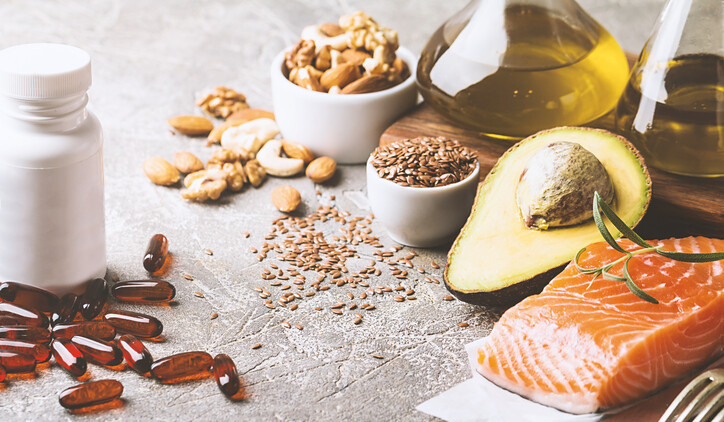What are fats?
Fats are components of Hydrogen, Carbon, and Oxygen. They are the basic building blocks of every cell. They provide the highest concentration of energy in the diet giving us about 9 calories per gram. On the other hand, protein and carbohydrates only have about 4 calories per gram. It’s a no-brainer that it’s an essential part of a nutritional diet that keeps us healthy.
At one point fats were considered a villain of health as the World shunned us from consuming fats because it was claimed to cause heart disease, high cholesterol, obesity, and many other health problems. This was further from the truth; not only was it false, but in actuality, fats are important to be consumed daily because their benefits are numerous for our health.
Many healthcare providers were preaching the low-fat diet narrative as the healthy way to go, but that was the biggest mistake that was done to humanity all over the world.
Even after the western world adopted the low-fat diet, it was still seen as the enemy of our health. People’s waistlines were getting bigger and people were sicker than ever in the history of humankind.
Obesity became an epidemic, and type 2 diabetes increased through the roof. Diseases that were prevalent among the adult population were found in young children such as heart disease and type 2 diabetes.
Fat was blamed for causing many diseases but fat in itself wasn’t the culprit, eating the wrong kind of fats can make you obese and can contribute to other health issues. Just like eating the wrong carbohydrates can lead to disease, good carbs benefit health and well-being; so is good fat which is needed by the body to function optimally.
Fats and Gut microbiome
How fat and gut health influence each other is important as fats are the building blocks of the cell membranes. The gut cells need fat to function properly. Research shows that eating the wrong kind of fats not only changes the diverse population of gut microbes but also increases inflammation.
One way that fats play a major role is the communication between the gut and the fats consumed by an individual that contributes to the way the body uses fat to keep healthy.
Good fats are the building blocks of the kind of cells you want to build to keep you healthy, promoting healthy gut bugs,
lowering inflammation, and supporting a healthy weight.
A recent study has found that supplementation of Omega 3 has the benefit of increasing diversity in gut bugs, specifically these bacteria ( Bifidobacterium, Akkermansia muciniphila, and Lactobacillus). fights against E.coli and balances gut microbes, Examples of Omega 3 are.
- EPA – Protection of the lining of the gut decreases inflammation in the gut,
- DHA – Promotes health signals in the brain and gut
- DPA – Reduce inflammation
Some myths or misconceptions about fats
Many people are stuck with misconceptions about fats when in reality, they are missing out on the benefits of healthy fats.
- Fats will make you gain weight- Not true so long as you eat a balanced diet and the right amount of fats recommended, you’ll not gain weight. On the contrary, if you eat a limitless amount of fats then rest assured you’ll gain weight.
- Low fats are the best choice- when the natural fats of the food are taken away, it’s always replaced with other ingredients like sugar, and flour as a thickener to give it flavor. But what’s worse? The fats or the added sugar?
- High-fat foods increase cholesterol- There are some fats that can increase cholesterol such as sunflower and soybeans but also some that can lower it like salmon and tuna fats
- Fat is bad for you is another big myth- Just like any other food, there are low-quality fats that are bad for your health and high-quality fats that are beneficial for your health. Examples of good fats are Avacado and Walnuts. Bad fats are processed oils like sunflower and soybean oil.
10 Reasons why fat matters
- It is a major source of energy
- Every cell in our body has some component of fat, so it is an essential element for any cell to function properly.
- Fats help you lose weight by making you full unlike carbs, the more eat the more you feel hungry and you continue to graze because you don’t feel satiated, leading to obesity and heart disease.
- Fats are required for some vitamins to be absorbed into the body eg Vitamin A, D, E, and K
- Some fats have anti-inflammatory effects and prevent inflammation in the body
- Support and increase gut microbiome and nutrient absorption.
- Fats lower heart disease
- Increase brain function and prevent dementia
- Helps with bone health
- It is essential for muscle movements
What Are the Different Types of Fats?
- Saturated fats– These fatty acids are without double bonds of hydrogen. Are fats in animals and animal products such as meat and dairy?
- Unsaturated fats- are divided into 2 groups which are good because they help to reduce inflammation, improve cholesterol levels, and can have many health benefits to the overall health of a person.
- Monosaturated fats– These are fats from Avacado, Macadamia nuts, and Olive oil.
- Polyunsaturated fats – Are consumed as Omega 3 and Omega 6 example of foods are nuts, seeds, and certain fish These are essential fats meaning our body can’t make them by itself so we have to get them from the food we eat.
- Transfats – These are mainly processed and artificially manmade fats, that turn from liquids to solid. They’re partially hydrogenated oils and are found in margarine, chips, fried food, and baked goods. These fats are hazardous to human health. And must be avoided as much as possible.
How much fat should you eat per day?
The World Health Organization ( WHO) has recommended omega-3 fatty acid intake of 0.5–2% of energy per day. Amount taken is based on age and sex. You can check the fact sheet by NIH ( National Institute of Health).
The best way is to abase your intake per the standard recommendation of daily intake of the dietitian by aiming at 20-35 % of your daily calories from fats. As stated by Maryann Walsh who is a registered dietitian in Southern Florida.
You can either calculate it by multiplying this percentage by 9 to get how much gram per day or simply use apps like MyFitnessPal to make your life easier.
Always keep an eye on how much fat you consume, setting a goal for your fat intake is important. Also, start tracking your meals and snack for a few days by watching your hunger signs and energy level.
Having some fat with every meal and snack improves hunger and lowers blood sugar.
A study performed by NIH has found that because of the disproportion of the ratio of Omega 6 to Omega 3. Due to people eating more Omega 6 than Omega 3 the risk of Obesity has skyrocketed.
Fats to avoid 
These are fats that are toxic to your health so avoid them at all costs.
- Canola and all vegetable oils
- Hydrogenated and partially hydrogenated oils
- Vegetable shortening
- Margarine
- Corn oil
- Soybean oil
- Peanut oil
What Kind of Fats Should You eat?
- Coconut – It’s one of the best cooking oils out there, and also can be used for skin and hair care.
- Extra Virgin Olive oil – Great for heart health, reduce cholesterol, and lower blood pressure
- Butter & Ghee – Helps in absorption of vitamins and minerals, good for brain health, excellent for cooking making food tasty
- Raw Milk – Provides vitamins, minerals, and natural enzymes
- Omega3 – Good sources of DHA/EPA found in Salmon and Salines
- Avacado – Increases good cholesterol while decreasing the bad, makes the immune system stronger and the skin healthier
- Nuts and Seeds – These a Vegan options for adding fats into your diet
- Eggs – Lower cholesterol given the bad history and also improve heart health
- Cheese – Good healthy cheese can be found in animals that are grass-fed for example, Ricotta, Feta, and goat cheese which can provide nutritious healthy cheese.
- Yogurt – If you can tolerate dairy yogurt is full of probiotics that are good for the gut
Tips for increasing essential oils
- Eating green leafy vegetables by increasing your salads, adding to smoothies, or even cooking them
- Increase wild-caught fish in your diet
- Get grass-fed animals for your meat consumption
- Up your seeds intakes like flax, hemp, and chia seeds; be sure to add them to your salads, smoothies, or even deserts.
- Get away from GMO eggs and instead go for free-range or pastured ones. Buying them from local farmers is the best.
- Upgrade your oils and steer away from GMO vegetable oils like soya beans and canola oil
The discussions regarding fats have been a confusing and overwhelming topic and still are. I hope this article has helped in making it easy for any person to understand a little bit better.
Fats, as seen in most studies, have many benefits and human beings need them in many functions of every part of our body. For example, fat is needed in every cell to do its job, that alone is a biggie as you all know our whole body is made up of cells.
In conclusion, eating a variety of good fats is essential to stay healthy. Fats that are prepared the right way and not manmade, for example, olive oil, grass-fed animal fats, organic seeds, and nuts extra that support your overall health, increase good gut microbes that reduce inflammation. Never, ever rely on one type of fat/oil but rather eat a variety to get all the benefits of a healthy diet.
References
- Dietary fat, the gut microbiota, and metabolic health – A systematic review conducted within the MyNewGut project – PubMed (nih.gov)
- Impact of dietary fat on gut microbiota and low-grade systemic inflammation: mechanisms and clinical implications on obesity – PubMed (nih.gov)
- The importance of the ratio of omega-6/omega-3 essential fatty acids – ScienceDirect
- Omega-3 Fatty Acids – Consumer (nih.gov)
- Olive oil, the Mediterranean diet, and arterial blood pressure: the Greek European Prospective Investigation into Cancer and Nutrition (EPIC) study – PubMed (nih.gov)

